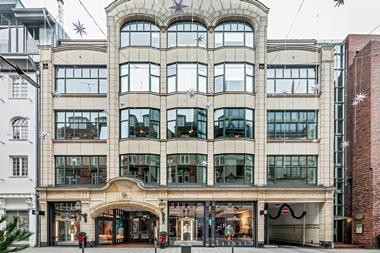The hotel sector has turned in better performance than mainstream sectors and its growing maturity now makes it at least a ‘must consider' for pension funds. Paul Strohm reports
When the Deal of the Year Awards finalists were announced during the International Hotel Investment Forum, staged in Berlin in March (2007), pension funds were notable by their absence. Given the pension funds' financial clout and the exceptional returns that have been generated by hotel investments over the last few years, the funds' absence from the upper echelons of the hotel investment market is perhaps surprising. However, as the initial yields of more traditionally acceptable investment types - in particular commercial real estate - become harder to justify on the basis of their intrinsic investment characteristics following a period of yield compression, pension funds may have to look a little bit harder at the hotels sector.
"Pension funds are missing a trick," according to Daniel Griffiths, director of investment at pubs and hotels agent Christie and Co.
He adds that he does not know why institutions have not gone for some of the trophy assets that have passed through the market recently. When hotel deals are put to institutions a luke-warm reception is likely he says.
"The hotels market has been as good as it's ever been and we've still not seen institutions investing," he says.Acknowledging that pension funds are by their nature "pretty risk averse", Griffiths does accept that hotels have historically been a relatively risky investment. The lack of sophistication of a market dominated by big hotel operators which, in the past, kept information to themselves, meant too much discomfort for pension funds more accustomed to a conventional property market in which there is a profusion of information resources, not least of which is Investment Property Databank, the independent producer of market indices and benchmarks.
In the last three-to-five years, however, more information has become available about the hotel investment market, thus enabling investors more readily to assess risks and rewards in the hotel sector. One reason is that more deals have been done - with other types of investor - which has increased the transparency of the business.
But Griffiths feels that the key to the future is that hotels have improved and compare well with more traditional commercial property investments. That could be something of an understatement and according to the international accountant and hotel consultant PKF, hotels have proved to be the best long-term property investment, outperforming the commercial sector by 32.5% over a 13-year period.
In its report Institutional Investment in UK, the firm revealed an annual total nominal return (income and capital) of 16.3% between 1992 and 2005 compared to the 12.3% return achieved by UK pension funds from property investments overall. PKF said that the figure is impressive considering the particular strength of the property market between 2000 to 2005 and the fact that, during the same period, hotels were hit by the 9/11 and London terrorist attacks, SARS, foot and mouth, and the Iraq war.
PKF says that the sector is set to continue its growth by nearly 8% over the next two years with over 23,000 rooms due to be built. This continues the "explosive growth" in 2006 in the number of branded budget hotel rooms, which the firm says made up 80% of the additional rooms added. PKF expects that, barring catastrophic events, the average room yield of UK hotels will continue growing, although at a lesser rate than the 10.1% increase of 2006.
Consultant Jones Lang LaSalle Hotels examines the scale and dynamics of the world market in its Hotel Investment Outlook 2007 report.
Globally, the volume of transactions in the hotel investment market was up 62.9% to $72.5bn (€53.8bn) in 2006 according to JLL, with record highs recorded in each world region. JLL expects the momentum to continue although the overall global volume of transactions is expected to settle back owing to a reduction in the number of portfolio transactions. JLL says the economic fundamentals behind the growth will remain in place. GDP growth, which individual hotel performance tends to track, is expected to slow marginally. The firm says that eastern Europe will produce the largest gains with an average of 5.3% expected compared to 5.5% in 2006. And the firm says that the supply pipeline will remain relatively "benign", with constraints that include construction costs and the "challenges of bringing projects to fruition".
Cross-border investment in hotels is expected to become more pronounced particularly as US investors see capitalisation rates falling in their home market and observe better returns elsewhere.
Europe was the most international regional market in 2006 with only 52% of business being home grown. Of the remainder, 26% was described as "global", 10% originated in the Middle East, 8.7% was from the US and 3.3% was from Asia.
Europe saw $26.8bn invested in hotel real estate in 2006, 44.1% up on the previous year. However, with interest rates edging up, JLL expects this to settle back to a more normal $15bn in 2007. Yields compressed in 2006 with leased assets trading on initial yields as low as 5.2% in western Europe and 6.5% in central and eastern Europe.
Hotels sold subject to management contracts or with vacant possession achieved yields of about 6.5% in western Europe and 7% in central and eastern Europe.
But despite a profusion of figures that would seem to indicate a relatively positive future - notwithstanding the current world-wide market jitters - ownership of hotel assets by UK Life and pension funds, which are among the largest investors in UK property, remains minimal relative to their overall property portfolio, according to PKF's head of hotel consultancy services Robert Barnard.
Frank Croston, a partner of Hamilton Hotel Partners, says that historically institutions have avoided hotels and prefer the liquidity of the stock market where there are numerous hotel companies so can get exposure without the market and management risk. They prefer direct investment in offices and retail where they can examine covenant, get upward-only rent reviews in place and relatively low level of management required.
Jones Lang LaSalle Hotels' global CEO Arthur de Haast, says that hotels are a major challenge for pension funds because although behind the deal is a property investment, when investors buy a hotel they buy into an operational business that does not yield a fixed rental income.
A contributing factor in the growth in hotel transactions has been the desire of hotel companies to get their real estate assets off the balance sheet, a trend that has led to the separation of property and operational activities into "propco" and "opco". In some cases this took the form of sale-and-lease back transactions in which the hotel group sold the property to an investor and took a lease on the building, giving the buyer the comfort of a predetermined rent along with the group's covenant. This provided a similar type of income and security as office or retail property and the investor was not involved in day-to-day management.
However, there are few hotel groups that will now do this because accounting regulations, especially in the US, mean that they are obliged to treat rent as a liability, which leaves them no further forward.
So, the model for splitting property and management is now the ‘sale and manageback' in which the hotelier sells its assets and signs a management contract with the investor.
This means that in some situations the investor will actually be the hotel staff's employer. The hotel company may merely be acting as agent with no liability for the staff. Added to this, the investor has to accept the natural fluctuations in the hotel's income.
"Pension funds have a great deal of difficulty with this. They are not in a position to cope with the intensity of management required," says de Haast.
However, the incentive is still there for those who can make it work. Frank Croston, a partner of Hamilton Hotel Partners, says that looking over a 20-year period, had institutional investors taken a stake in the hotel sector and held it for 10 years or more it would have outperformed all property indexes and the FTSE.
The other side of the risk/reward coin is the behaviour of the private equity investors that have come to the fore as investors in the hotel market. It is their names that dominated the list of awards nominees at the aforementioned International Hotel Investment Forum, for instance. Private equity investors have tended to be better placed to deal with hotel investments and have been prepared to take on the required management expertise to handle the particular needs of hotel investments. "It is a good opportunity - they have focused on the sector and done well out of it," says de Haast.
"They have enjoyed three-to-five years of good performance, have taken the risk, acquired the expertise and asset management skills, they have done extremely well and made a lot of money."
But as Croston points out, private equity funds have a much closer time horizon and their aim is typically to double their equity over a five-year period. Furthermore, as he explains, "private equity boys are looking for ‘a story'".
By this he means that the private equity investors are looking for an opportunity for restructuring, rebranding, refurbishing or any other radical means to bring about a step change in the value of the business. But he says that pension funds' more conservative focus on quality and stability of earnings can also be served. PKF's studies, he says, do not assume radical transformation but absolutely normal performance.
De Haast adds that hotels offer the investment characteristic of early cycle recovery - when the economy picks up, they are in a position to adjust room rate on a daily basis. Although this can also work in the opposite direction de Haast says that this can make the sector a good diversification play that sits somewhere between property and equities.
If pension funds can find the means to accept the wider implications of hotel ownership they can participate in growth that is substantially better than the property market without any of the drama that follows the private equity investors.
What pension funds will need for successful hotel investment is the knowledge to manage their holdings. US pension funds, which have embraced the hotel sector with some enthusiasm, have the scale to justify taking on the necessary expertise in-house, and can adopt a portfolio approach to hotel investment. Where scale makes this impractical, expertise can be outsourced.
Christie & Co's Griffiths says that the hotel industry also has to make pension fund investors more comfortable and adds that one example of a company doing this is the rapidly expanding Travelodge. The company offers investors friendly terms and as a consequence is doing lots of deals. And, says Griffiths, there is the advantage that the stock is, generally, new.
But there is "a raft of acquisition opportunities in private hands" says Croston and many of these would not suit private equity investors because they have either fulfilled their potential or are ticking along as a mature business.
"It is fair to say that for the last five years, private equity has been underwriting an internal rate of return of 20%, whereas institutional investors' expectations should be no more than an internal rate of return of 10%, or high single digits over an extended hold."
This "extended hold" is important says Croston, because the hotel industry is so cyclical and responds to changes in GDP. "You've got to expect to show cycles and you don't want to have to crystalise your invesment in a downturn."
But this long-term view is, he says, a perfect match for pension funds.
The intense activity by private equity investors over the past few years could well provide a rich seam of hotel investment stock for the pension funds. Their reworked holdings should produce more predictable, institutional-grade investments. "Someone will pick up the exit of the private equity firms," says de Haast.












